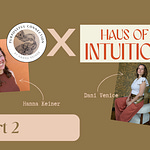Last week, I shared my Monday morning practice—Momentum Muse. Every Monday at 9am, I check in with where I’m at and where I want to be. The practice helps me feel grounded and in charge. I also shared that I have not yet figured out how to make the hours before Momentum Muse go by a bit more smoothly. Mornings in my house feel rushed, frazzled, and disjointed.
Let’s see if we can change that!
I'm trying something different today. I’m coaching myself through a challenge using the GROW model. I’ve use this framework to structure my thoughts while on a walk or using my journal. This time, I recorded myself thinking through the prompts.1
Will it work? I don’t know! Let’s find out.
You can either watch the video or read the summary of what happened below—or both!
But first, what is this GROW model? GROW is a common coaching framework that helps structure problem-solving and reflection. It stands for:
Goal: What do I want?
Reality: What is happening now?
Options: What could I do?
Way Forward: What will I do?
I’ve included questions at the bottom of this email if you want to try this out yourself. If you’re curious, you can book a free sample coaching session with me—no strings attached, I promise. Bring any topic you want to work through and we’ll explore together. Not sure it’s the right topic for a coaching conversation? Ask me! Reply to this email or send me a DM.
My Coaching Conversation with Myself…
Goal: What Do I Want?
I want mornings to feel calmer, more structured, and less frustrating. Specifically, I want:
To be more present and spend less time on my phone.
To check off the necessary tasks efficiently without feeling frazzled.
A bit more independence from my kids (fewer reminders from me).
A structure that helps guide the flow of the morning without being rigid.
How will I know I’ve achieved this? I’ll feel a greater sense of calm. I’ll drop the kids off and come home feeling ready to start my day instead of depleted.
Reality: What’s Happening Now?
Mornings in my house are stressful. I’m in charge of getting my kids ready for school, taking the dog out, and getting myself prepared for the day. I don’t enjoy it. It feels like the most frustrating part of my day.
In an ideal world, mornings would feel smoother—not necessarily the highlight of the day, but at least not chaotic. Right now, I find myself waiting for my kids to get ready (they need many reminders) and defaulting to scrolling on my phone instead of using that time intentionally. By the time I drop them off, I feel drained, unproductive, and like I’ve already started the day on the wrong foot.
Options: What Could I Do?
I’ve already tried a few things in the past, some with mixed success:
Checklists for the kids – Worked for a while but got buried under clutter.
A whiteboard on the fridge – Helps me track tasks, but it’s not engaging.
Locking my phone away in the morning – Effective when I stick to it, but it’s crept back in.
Playing music in the mornings – Used to help with energy and mood but fell out of habit.
Waking up earlier – Helps, but I struggle with consistency.
Other potential options:
Reviving the checklist system but making it more engaging for the kids.
Setting a clear “phone-free” window in the morning.
Reintroducing morning music to shift the atmosphere.
Structuring my own to-do list in a way that feels fun and inviting.
Creating rewards for anyone who completed their tasks and has some extra time before we have to leave.
Way Forward: What Will I Do?
Instead of overhauling everything at once, I’ll focus on a few small shifts:
Reintroduce music in the mornings. I’ll test if it helps create a better mood.
Put my phone out of reach. I’ll place it in a different room until after school drop-off.
Create a simple & fun checklist. Not a rigid schedule, but a guide for the flow of the morning, helping me stay focused.
Reintroduce a checklist for my children. I’ll have it available so they can opt in if they choose to.
Keep rewards in sight. Setting my book on the couch and having some activities ready might help motivate us to move through our lists efficiently.
I’ll try these changes for a week and see what impact they have. If something works, I’ll refine it. If not, I’ll adjust.
Personal Reflections
I feel good about my plan forward. I also want to highlight some additional reflections:
Coaching is a time to think, to verbally process, to untangle. I’ve had these feelings of frustration for a while now, and until I sat down and made space to think it through, I didn’t even know where to start. It requires courage to say: I feel stuck; I haven’t been able to sort this out on my own.
It’s not about the perfect question. Instead, it’s important to be curious and have a framework that is future oriented instead of being in venting mode (though there is room for that—sometimes in “reality”, we just need to let it all out first).
Notice: my goal isn’t super specific - and that’s okay! It went from “feeling calm” to “having a framework”. For me, it was sufficient to have a direction. Sometimes though, we spend more time exploring what we even want—that can be the hardest part.
You know more than you think. “What have you tried already?” and “What are you doing right?" sparked a lot of ideas and reminded me of things that actually have worked in the past. I had completely forgotten about those ideas, and naming them gave me a boost of confidence that I can figure this out.
Structure as a theme. I can’t say I am surprised that structure is coming up as a theme—I have been thinking a lot about the structures we create to allow for the playful parts to have fun. In a coaching conversation, I’d ask some follow up questions about this to evoke awareness around wider themes or topics that are connected.
Small but meaningful shifts in what I want. Did you notice the part where I said “I want to spend time on my phone as a reward” and then realized: that’s not true at all, I would rather read my book. My curious and open mindset helped me notice that what I thought I wanted isn’t what I actually want.
To wrap this up, I want to say: I didn’t have any of this thought out. I didn’t know what i’d be saying here as I was working my way through the framework. We’ll see how it goes and what changes will stick.
One immediate shift that I noticed is this: I went from feeling frustrated and uncertain if I’d ever be able to figure this out to feeling confident and in charge. I know I can experiment and I know I can shift my intention. That in itself feels very empowering.
Now, if you want to try this out for yourself, below are questions you can use to as a guide. If you’re not getting the insights and action you want, go ahead and schedule a free session with me. I want to help.
Want the question in a pretty download? Here you go:
GROW Model Questions
The GROW model includes four stages: Goal setting (G), an assessment of the current reality (R), an exploration of options (O), and identifying the way forward (W).
You don’t need to answer all questions. Select the ones that you are drawn to.
What is your goal?
What do you want? Complete this sentence: “I want to….”
What would a great outcome be for you from this?
What will achieving the goal enable you to do?
When do you want to have achieved this outcome?
How would you break this goal down into smaller pieces?
How will you know you have achieved your outcome? What will you see / hear / feel?
What does your reality look like?
How do you feel about this?
What are you already doing that takes you toward your goal?
What are you doing that is getting in the way of your goal?
What internal resistance do you have to taking action?
What resources do you already have?
What other resources do you need?
What are you most/least confident about?
What are you doing right?
What are your options?
What ideas do you have?
What alternatives do you have?
What has worked in the past?
What else could work here?
Who could help you with this?
What will you do?
What will you do?
How will you do that?
When will you do it?
What might happen to prevent you from taking this action?
What can you do to support yourself?
What is your first step?
Let me know in the comments: was this helpful? Would you like to see more frameworks like this? And if you try it out, what are your reflections?
Until next week.
Take care,
Hanna
Until my phone storage was full, in case you’re wondering about the abrupt ending.










